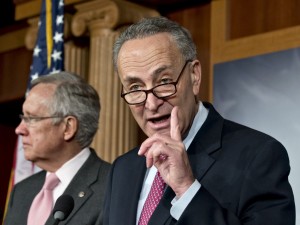‘Fiscal Cliff’ talks still uncertain.
 It’s less than a month before the ‘fiscal cliff’ but the White House and the Congress are yet to reach a common ground.
It’s less than a month before the ‘fiscal cliff’ but the White House and the Congress are yet to reach a common ground.
Last week, the White House delivered a $1.6 trillion proposal that presses for higher federal tax rates on higher income tax brackets- as well as the power for the President to raise the national debt limit- in an effort to tame the effects of the impending year-end fiscal disaster. Republicans were quick to counter the White House plan with their version of ‘fiscal cliff’ proposal submitted to the Congress on Monday. Republicans strongly oppose federal tax rate increase, and instead aims to avert the effects of tax cut expirations and automatic federal tax rate increases by curbing federal spending on benefit programs such as Medicare and Medicaid.
White House and Republican point persons have been busily running around this week- appearing on interviews to reiterate why or why not federal taxes should increase- but there is still very little progress in the negotiations. Based on the current pace of negotiations, an understanding may not be reached until the day before the ‘fiscal cliff.’
The ‘fiscal cliff’ is the term used to refer to the fiscal crisis to be faced by the US government by the end of 2012 due to the concurrent expiration of federal unemployment benefits and the Bush federal tax cuts, as well as the commencement of the Budget Control Act of 2011. Federal tax rates for payrolls will rise from 4.2 to 6.2 percent and taxpayers will have to pay additional federal taxes for Medicare.
Categories: Federal Tax Tags: buffet rule, federal income tax, federal tax, fiscall cliff, income tax, republican, tax code, tax law, tax reform
Federal Tax Planning for the “Fiscal Cliff”
 The American stock market has been going down for several days now since the sprouting of fiscal cliff debates after the election. Proponents argue that, along with less government and federal tax spending, the fiscal cliff will help cut down federal budget deficits by the end of 2012 and early 2013.
The American stock market has been going down for several days now since the sprouting of fiscal cliff debates after the election. Proponents argue that, along with less government and federal tax spending, the fiscal cliff will help cut down federal budget deficits by the end of 2012 and early 2013.
However, many critics warn that the expiration of federal tax cuts and the introduction of new federal taxes in 2013 will cause another economic recession in the future.
If the fiscal cliff takes effect, US taxpayers will witness a rise in the federal taxes. For instance, the top federal tax bracket for income will rise from 35 percent to 39.6 percent, while top capital gain rates will rise to 20 percent from the present 15 percent. The federal tax for employee payroll goes back to 6.2 percent as soon as the payroll tax holiday expires by the end of December and dividends will now be taxed as ordinary income. Moreover, estates worth over $1 million will be taxed at 55 percent from the present 35 percent.
With the impending federal tax increases at the turn of the year, there are several federal tax planning strategies to help tax payers cope with the possible federal tax rate changes after the implementation of the fiscal cliff. Investors and taxpayers are advised to take advantage of the federal tax programs before they expire, convert to Roth IRA, invest in municipal bonds, and sell appreciated assets in 2012 in order to avoid federal tax rate gains and Medicare surtax in 2013.
Categories: Federal Tax Tags: federal income tax, federal tax, fiscal cliff, income tax, tax increase, tax law, tax reform
New ‘fiscal cliff’ GOP revives failed budget talks
 Republicans once again try to revive budget talks with the administration by proposing a $2.2 trillion ‘fiscal cliff’ offer in the House of Representatives. The Republican proposal from House Speaker John Boehner of Ohio counters the $1.6 trillion plan supported by the White House.
Republicans once again try to revive budget talks with the administration by proposing a $2.2 trillion ‘fiscal cliff’ offer in the House of Representatives. The Republican proposal from House Speaker John Boehner of Ohio counters the $1.6 trillion plan supported by the White House.
The White House had earlier proposed higher federal tax rates for the next decade, higher national debt limits, and possible extension of Social Security payroll tax cuts.
While the White House plan pushes for higher federal tax rates on the wealthy, the Republican version of the ‘fiscal cliff’ plan relies on curbing government and social service spending in order to avoid the ‘fiscal cliff’ and raise federal tax revenues in the next decade.
The ‘fiscal cliff’ is a term used to refer to the combined effects of the expiration of Bush federal tax cuts by the end of December, the beginning of across-the-board spending cuts in January, the beginning of federal taxes related to President Obama’s healthcare policies, and the failure of the Congress and the administration to agree upon a budget deal in 2011.
The new GOP echoes the main ideas from the failed budget talks with the president in 2011. However, Obama and the Democrats are now more bent on imposing higher federal tax rates on the wealthy and less willing to agree on budget cuts on benefit programs such as Medicare after re-election.
With ‘fiscal cliff’ nearing, Boehner and six other House Republicans state that their priority is to find a plan that can be “signed into law in the next couple of weeks.”
Categories: Federal Tax Tags: federal income tax, federal tax, fiscall cliff, income tax, tax cuts, tax law, tax reform

